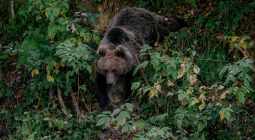“In the short term, that is not bad per se, because there will be suitable area farther north; it’s a huge piece of land. But ultimately, there is no more land at some point, and then they fall into the ocean. It goes in one direction. The Arctic is becoming smaller and smaller all the time,” he says.
After more than an hour of driving in search of a musk ox, we are close to giving up. We rumble alongside a dwindling river fed by meltwater from the nearby Russell Glacier. Strangely shaped rocks and patches of colour in the landscape provoke several more false alarms.
Then, in the shadow of the ice sheet, we spot a group of eight musk oxen huddled together. Two members of the herd battle playfully with each other on the riverbed, which will soon run dry as temperatures drop.
We stand and watch the shaggy masses move back towards the tundra, where they will become invisible once again in their surroundings, feeding until the Arctic night returns.



